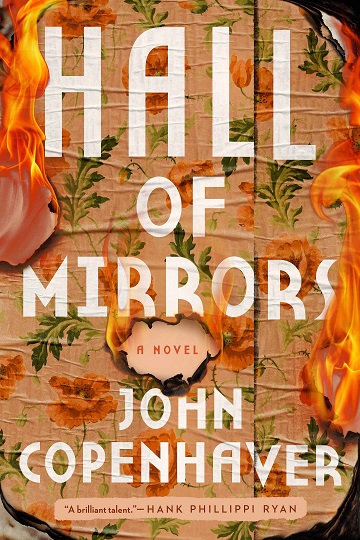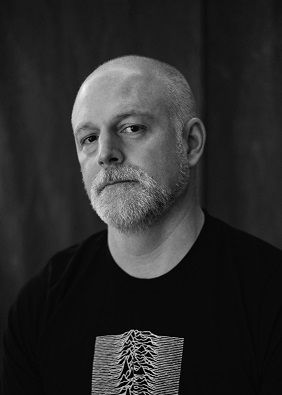I struggled the most with how much context I needed to provide readers who may enter my trilogy with the second book. You want to give enough context to make them feel oriented but not so much that readers who have read The Savage Kind get bored. It’s tricky!
John Copen Haver – 7 June 2024
The Back Flap
When a popular mystery novelist dies suspiciously, his writing partner must untangle the author’s connection to a serial killer in award-winning John Copenhaver’s new novel set in 1950s McCarthy-era Washington, DC.
In May 1954, Lionel Kane witnesses his apartment engulfed in flames with his lover and writing partner, Roger Raymond, inside. Police declare it a suicide due to gas ignition, but Lionel refuses to believe Roger was suicidal.
A month earlier, Judy Nightingale and Philippa Watson—the tenacious and troubled heroines from The Savage Kind—attend a lecture by Roger and, being eager fans, befriend him. He has just been fired from his day job at the State Department, another victim of the Lavender Scare, an anti-gay crusade led by figures like Senator Joseph McCarthy and J. Edgar Hoover, claiming homosexuals are security risks. Little do Judy and Philippa know, but their obsessive manhunt of the past several years has fueled the flames of his dismissal.
They have been tracking their old enemy Adrian Bogdan, a spy and vicious serial killer protected by powerful forces in the government. He’s on the rampage again, and the police are ignoring his crimes. Frustrated, they send their research to the media and their favorite mystery writer anonymously, hoping to inspire someone, somehow, to publish on the crimes—anything to draw Bogdan out. But has their persistence brought deadly forces to the writing team behind their most beloved books?
In the wake of Roger’s death, Lionel searches for clues, but Judy and Philippa threaten his quest, concealing dark secrets of their own. As the crimes of the past and present converge, danger mounts, and the characters race to uncover the truth, even if it means bending their moral boundaries to stop a killer.
About the book
When did you start writing the book?
Before I published The Savage Kind in 2022, I outlined Hall of Mirrors and the third book in the trilogy so that I could plant Easter Egg like clues for readers along the way and so I fully understood the character arcs. I wrote the bulk of Hall of Mirrors in the Spring of 2023.
How long did it take you to write it?
About a year. Since I had an outline, it moved fairly quickly.
Where did you get the idea from?
I learned about a mystery author named Patrick Quentin, whose pen name several different writers wrote under. Richard Wilson Webb and Hugh Wheeler partnered to write as Quentin, as well as Q. Patrick and Jonathan Stagge. I became fascinated by writing partners who use a single pseudonym, and the complexities and intimacies of such a relationship. What if their pseudonym projected a hypermasculine tough guy, but in fact, they were two gay guys, performing for straight audience. I also wanted to write about the Lavender Scare the 1950s and the how queer people hid their true selves to survive. It all began to fit together.
Were there any parts of the book where you struggled?
Sure! I struggled the most with how much context I needed to provide readers who may enter my trilogy with the second book. You want to give enough context to make them feel oriented but not so much that readers who have read The Savage Kind get bored. It’s tricky!
What came easily?
The plot. Character is always the beating heart of my storytelling, but the plot is where I have fun, and this plot came to me easily for some reason. Of course, I shaped it more with the details, but I saw its basic outline quickly.
Are your characters entirely fictitious or have you borrowed from real world people you know?
My characters are fragments of myself. If I try to intentionally write a character like someone I know, the character always fails. If I try to describe some part of myself, then I succeed.
We all know how important it is for writers to read. Are there any particular authors that have influenced how you write and, if so, how have they influenced you?
Many writers have influenced me. Of course, there are many crime writers, from Patricia Highsmith to Ross MacDonald to Gillian Flynn to Tana French. In truth, writers outside of my genre have influenced me the most. Shirley Jackson and Margaret Atwood understand how to thread character development through every turn of phrase, every observation. You read a page, and although you don’t have the complete story, you feel the full character standing before you.
Do you have a target reader?
I like to write about multilayered women and queer characters who find themselves in morally complex situations. If you like to read about those kinds of characters and situations, you’re my target reader!
About Writing
Do you have a writing process? If so can you please describe it?
I pause when I’m finished with each chapter and spend time combing over the chapter and editing it. This part of the process is as much about learning the characters as it is editing the language. When I finish the chapter, I have a robo reader read it to me. I’m on the dyslexia spectrum, so this helps me catch errors that I can’t see visually.
Do you outline? If so, do you do so extensively or just chapter headings and a couple of sentences?
I do outline. I used not to, but now I fully embrace the joys of outlining. I first write up a broad outline to gain a sense of the story and then I break into down into scenes—the building blocks of story!–and I do describe each scene with a sentence or two. I use Scrivener which really helps and allows a great deal of flexibility.
Do you edit as you go or wait until you’ve finished?
I’ve answered this, but I’ll add that I have a clean manuscript when I’m finished, but the editing is far from over. Every writer needs an editor, and I’m no different. My agent, Annie Bomke, is usually my first editor. I’m so thankful for her thoughtful and perceptive feedback.
Do you listen to music while you write? If yes, what gets the fingers tapping?
I tend to listen to film scores. It helps me focus and drift into the world of my story. Here are a few of my favorite composers: Carter Burwell, Mychael Danna, Michael Giacchino, Paul Leonard-Morgan, and Ariel Marx.
About Publishing
Did you submit your work to Agents?
Yes, I have a wonderful agent! It took some searching, but I’m lucky to have a great agent.
What made you decide to go Indie, whether self-publishing or with an indie publisher? Was it a particular event or a gradual process?
It was a gradual process. Annie began by pitching Dodging and Burning, my debut, to the Big 5, and I received many rejections, most of which complimented the novel but would say a version of “We love it, but don’t know how to market it.” They thought it was either too mystery or too literary! (I think they were saying it was too gay.) Anyway, we pivoted to the independent publishers, who are more open to something new, and ended up with Pegasus, which has been a very positive experience.
Did you get your book cover professionally done or did you do it yourself?
All my covers were done professionally by Derek Thorton of Notch Design, and they’re all gorgeous!
Do you have a marketing plan for the book or are you just winging it?
I’m trying not to wing it—although, aren’t all of us always winging it to a certain degree? Pegasus has a great in-house publicist, and I hired the crew at Booksparks to supplement promotions. It’s a tough market and complex—from mainstream media to influencers—so I need help cracking the mystery of marketing and publicity.
Any advice that you would like to give to other newbies considering becoming Indie authors?
My best advice is to finish your work and make it the best you can before you put on your business/marketing hat. We need better books, not more books. And “better,” I don’t mean more literary; I just mean better at achieving their goal, whether it’s pure escapism (which is totally cool!) or something more complicated and nuanced. When the time comes, put on that business and marketing hat and think about how best to reach your audience. Also, consider your writing career as a professional pursuit, built over time, and avoid fantasies about making it big. You have no control over making it big.
About You
Where did you grow up?
In a small town in southwestern Virginia called Marion. I love the mountains—their mystery and their beauty.
Where do you live now?
Richmond, Virginia. It’s a cool town, not so mountainous.
What would you like readers to know about you?
Although I write crime fiction, I’m interested in other genres as well, especially the gothic. I love ghost stories!
What are you working on now?
A contemporary ghost story about my hometown—and my complex relationship with nostalgia.
End of Interview:
For more from John Copenhaver visit his website and follow him on Facebook, Twitter, and Instagram.
Get your copy of Hall of Mirrors from Amazon US or Amazon UK.


